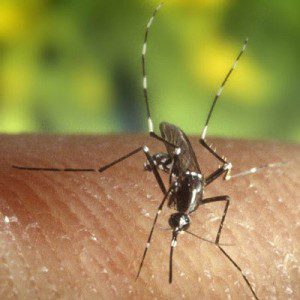Should We Be Worried About Zika Virus Here in the Northeast?
By Chris Williams on March 3, 2016.
As winter is ending and we’re starting to feel hints of warmer weather, folks are getting worried about mosquitoes and Zika virus. Every time we hear a news story about Zika, it seems that it’s surfaced in yet another state and predictions are rampant. Zika virus is especially scary because one of its primary manifestations is birth defects in newborns. Children are born with deformed brains after the mother is infected with Zika, presumably from the bite of a mosquito (see Zika, Another Mosquito Disease to Worry About?).
Zika first made the news in Brazil but it is established in most other Central and South American countries and has now made inroads into Mexico and Puerto Rico. It seems that it will be only a matter of time before Zika is transmitted by mosquitoes in the continental U.S. At the present time, many states have reported cases of Zika virus, but so far they can all be traced to travelers who spent time in Zika countries and then returned home.
The Mosquito Vectors Don’t Like the Cold
Aedes aegypti, the “yellow fever mosquito,” is the primary vector of Zika virus. This is a tropical mosquito and is found in the U.S. in southern, coastal regions. Although it is gradually expanding its range northward, due in part to global warming, there is no indication that this mosquito will reach the Northeast. But, a closely related mosquito, Aedes albopictus, the Asian tiger mosquito, has a much broader range in the eastern U.S. and is suspected of also being able to transmit the Zika virus.
The Asian tiger mosquito occurs primarily in the eastern U.S. and has now been found in 32 states, as far north as Pennsylvania and Illinois, with pockets of infestation in other regions. This mosquito was first discovered in Massachusetts in 2000 and can now be found in eastern Massachusetts and at least in southern New Hampshire. Its ability to survive winters is what prevents its march northward, but as winters get warmer, new areas open up to this mosquito.
The Asian tiger mosquito is a pretty little thing with distinctive black and white stripes around its legs, resembling a tiger, and a white stripe down the center of its back. It also deserves the tiger name because it is an aggressive biter. It is difficult to avoid this mosquito since it is a daytime biter. The Asian tiger is an “opportunistic container breeder” that is often associated with discarded tires but has adapted to lay eggs in in all kinds of manmade and natural containers that will hold water.
We Don’t Have Zika Now, But…

Asian tiger mosquito showing off its stripes
Most mosquito diseases (and their vectors) are tropical in origin and we get off pretty lightly this far north. Another reason to be glad for our Northeastern winters. It is theoretically possible that we will at some time in the future have Zika virus transmission in the Northeast as the Asian tiger mosquito moves into the region. But there are many unknowns. Even if the mosquito is present this far north, we don’t know if the tropical virus itself can survive northern winters and successfully replicate.
For now, we should be
more concerned about other mosquito- transmitted diseases, such as West Nile virus, that we know are present in the Northeast and that are being spread by the Asian tiger and other mosquito species. But if worry about Zika virus gets us to pay attention to mosquito breeding sites and gets us to use mosquito repellents routinely, that’s a good thing. Be safe out there!
For more on protecting your family from mosquito bites, see these Colonial blogs:
- Spring is the Time for a Mosquito Check of Your Yard
- How to Eliminate Mosquitoes From Your Yard – Advice From the Pros
- What’s the Best Insect Repellent?
- Using Insect Repellents on Children
ADDENDUM 3/2/16: Just as this blog was about to post online, New Hampshire announced its first case of Zika virus. This, however, was a case of sexual transmission not direct transmission by a mosquito. The female patient had sex with a man who had traveled to a country where Zika was common and had returned with the disease. She was not pregnant and has fully recovered.